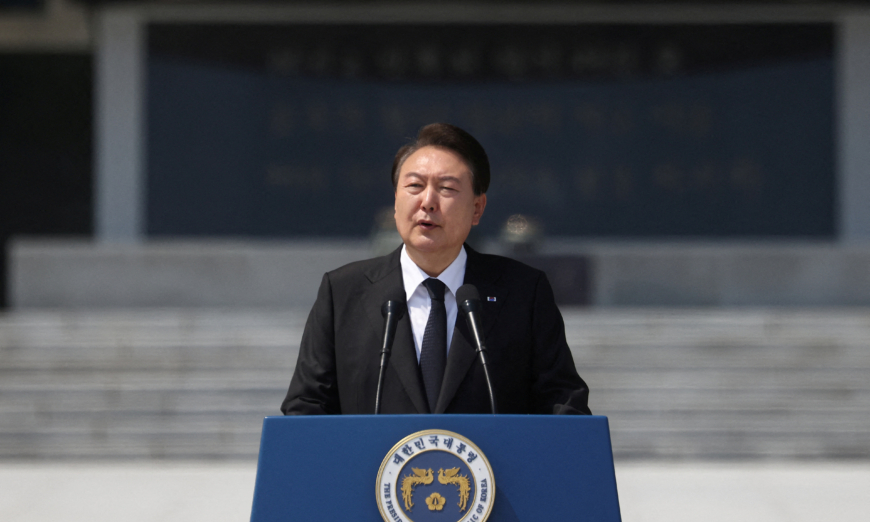South Korea’s president has urged the Unification Ministry to change its approach toward North Korea and stop functioning like a “support department” for Pyongyang amid the rising tensions between the two countries.
President Yoon Suk-yeol observed that the ministry had focused on supporting North Korea and called for a shift in its approach, Yonhap News Agency reported.
“From now on, the Unification Ministry must carry out its proper responsibilities in accordance with the constitutional principles that unification must be based on liberal democratic order,” Yoon said at a meeting on Sunday.
“The unification that we pursue must be one in which all the people from the South and the North enjoy better lives and are treated better as human beings,” he added.
His remarks came in light of Kim Yung-ho’s nomination as the new unification minister. Kim, 63, is known as a conservative scholar and an outspoken critic of North Korea’s human rights record.
Kim served as a presidential secretary for unification and a human rights envoy under the conservative Lee Myung-bak and Park Geun-hye administrations.
The unification ministry’s role ranges from cross-border dialogue and exchanges to studying human rights abuses in North Korea and helping defectors resettle in the South.
But the ministry has seen its standing change along with relations between the neighbors. The two Koreas remain technically at war under an armistice in the 1950–53 Korean War.
According to Yoon’s office, the primary focus of the ministry will now be to analyze and respond to the latest developments in North Korea while also helping to address the country’s human rights issues.
However, Kim’s nomination is expected to further strain the relations between the two Koreas, as North Korea viewed criticism of its human rights conditions as a part of an alleged plot to overthrow its rulers.
Two North Korean soldiers walk along a road leading to their camp on the outskirts of Pyongyang on Feb. 14, 2003. (Goh Chai Hin/AFP via Getty Images)
On April 10, North Korea refused to answer South Korea’s calls through both the joint liaison communication channel and the military hotline after South Korea published its annual report documenting “gruesome” human rights abuses in North Korea.
This marked the first time South Korea has disclosed its annual report on North Korea since the North Korea Human Rights Act was passed in 2016, marking a shift from the former Moon Jae-in administration, which kept such reports confidential in a bid to appease North Korea.
Earlier this year, the Unification Ministry presented a report on its plans and prospects for 2023, which includes efforts to provide North Korea with humanitarian aid in a bid to revive stalled denuclearization talks.
The ministry aimed to strengthen South Korea’s defensive posture against North Korean provocations through an alliance with the United States while also creating a conducive environment for dialogue.
It stated that South Korea would seek to make “direct and indirect contact” with North Korea through civic groups and international groups as part of efforts to normalize relations with the regime.
The ministry also plans to publish an annual report detailing the human rights situation in North Korea and make public the contents of the Rodong Sinmun, the mouthpiece of North Korea’s ruling party.
In response to the report, Yoon ordered the ministry to conduct research and share its findings with the local and global community about North Korea’s politics, economic, social, and human rights situation.
Yoon has said that both South Korea and North Korea must undergo changes in order for reunification to happen.
“Reunification can happen suddenly, so only when we are prepared can we realize it,” he said, according to his office. “Please prepare with level-headed judgment rather than through an emotional approach.”
North Korea has suspended virtually all cooperation with South Korea since the collapse of its nuclear negotiations with the United States in 2019 over disagreements in exchanging the release of U.S.-led sanctions and steps to cut back its nuclear weapons and missiles program.
In August 2022, Yoon offered North Korea economic benefits in exchange for denuclearization steps, but the offer was rejected by the North Korean regime. Kim said there would be no denuclearization talks, negotiations, or “bargaining chips” in that process.
Reuters and the Associated Press contributed to this report.




